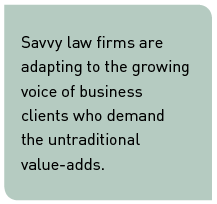HOME | ABOUT US | MEDIA KIT | CONTACT US | INQUIRE
HOME | ABOUT US | MEDIA KIT | CONTACT US | INQUIRE
 */?>
*/?>
Shakespeare’s famous line, uttered by Dick the Butcher in “Henry VI”, has long been debated. Was it a lawyer-bashing proclamation of the ultimate obtainable utopia (imagine a world without the creatures), or the Bard’s suggestion that Dick’s gang’s surest means to a revolution would be to eliminate those who preserved order and maintained society’s indispensable documents? As a member of the bar, I have to defend the latter. Lawyers have long been viewed as critical partners to government and business, no matter how much you might want to kill them.
Today, that has never been truer. In the post-Great Recession world, clients and lawyers find a new reality; one that demands that the legal industry adapt to a changing, innovative business landscape.
For decades, the legal industry was unchanged. Clients had their favorite firms, and they were content to stick with them and tolerate rate increases and very little innovation in service delivery. But the economic downturn changed everything. Businesses were forced to explore alternative legal services (boutique firms, third-party vendors, offshore staffing, and even on-line “lawyer replacement” options). Now, during the recovery, that experience has made clients justifiably more demanding of the traditional law firm models.
Today, clients want the things they found while working with the out-of-category competition. They want more transparency and predictability in the handling of their projects. And they finally completed the long transition to demanding alternative fee arrangements. But more than anything, they are looking for a differentiator in what they see as a fungible mass of larger firms that all similarly offer sophisticated and expensive legal advice. They want a partner.
Clients who have mastered the new reality of legal services have identified lawyers and law firms who offer more than the traditional project-based work. They found lawyers who are willing to invest—on their dime—in learning the client’s business and making themselves an indispensable part of the client’s operations. In many ways, those lawyers have become an informal part of the client’s management team, fielding as many calls about networking introductions and untraditional value-adds as they do about legal analysis and counseling issues.
The problem is businesses are finding a dearth of lawyers who are willing or capable of making this adaptation. During the Great Recession, the legal industry experienced its own internal structural changes—beyond those mandated by clients. Graduates poured out of law schools at unprecedented rates during a period when legal job availability was at an all-time low, resulting in thousands of lawyers being forced to open their own firms without any formal training or traditional mentoring. Additionally, many law firms reacted to the downturn with unprecedented merger growth, believing globalization to be the only antidote to the apparent market maturity that had turned their seller’s market into a buyer’s market.
 These developments created a donut hole in the legal market. Thousands of lawyers now work in firms too small (and untrained) to properly integrate with business clients who need sophisticated partners. Thousands more work in overly structured firms, stripping them of the freedom to innovate and invest the time and resources to learn a client’s business.
These developments created a donut hole in the legal market. Thousands of lawyers now work in firms too small (and untrained) to properly integrate with business clients who need sophisticated partners. Thousands more work in overly structured firms, stripping them of the freedom to innovate and invest the time and resources to learn a client’s business.
But the savvy law firms are adapting to the growing voice of business clients who demand the untraditional value-adds. And the happiest clients are those who are vocalizing this demand. Business executives should approach the legal industry from the position of power they now hold. Ask your law firm how it adds value to your business. If the response focuses on having smart lawyers who work hard (table stakes in today’s environment), it may be time to ask your peers if they have found those firms who have adapted to form the type of truly indispensable partnerships that go beyond simply handling legal projects.
Kansas City is a place on the verge of unprecedented innovation and entrepreneurism, likely to result in dozens of existing and new businesses that need legal partners who will help them not only navigate legal issues, but also think outside the box to truly help them grow their organizations. And I believe our legal market is up for that challenge. So let’s not kill all the lawyers. Just talk to them. Tell them why you need more. If they read this article, they won’t even bill you for it.